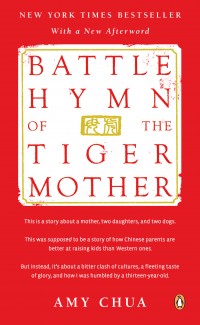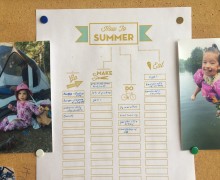 When I go on vacation I typically read one or more books per day. I ignore my family and stay up all night and just consume them — some literature, some Oprah picks, some beach fluff — but always all fiction. It’s really out of hand.
When I go on vacation I typically read one or more books per day. I ignore my family and stay up all night and just consume them — some literature, some Oprah picks, some beach fluff — but always all fiction. It’s really out of hand.
So this year I decided to actually interact with my husband and children — that is why we take a family vacation after all — and read only non-fiction. Non-fiction I can put down (on occasion) to make a sandcastle. Or dinner.
On my reader this trip were two modern classics about parenting (oh, let’s be honest, mothering). The Battle Hymn of the Tiger Mother by Amy Chua and Bringing up Bébé: One American Mother Discovers the Wisdom of French Parenting by Pamela Druckerman.
Both are memoirs, a favorite genre of mine, and both women fantastic writers and story tellers, so I did actually have trouble putting them down, though my family at least got fed. Both books were funny, honest, and challenging and made me think, a lot, about my approach to motherhood and American parenting and cultural differences in general. That’s great reading.
A few things that struck home for me, and continue to make me think:
1. The drama over Chua’s book is way out of hand. I just don’t see what the big hairy deal is, other than it provided fodder for overheated punditry or people who react only to others’ reactions without reading the book (if those are, in fact, two separate categories).
I hope at least it helped her sell more books, because as a memoir (and that’s what it is, not a how-to guide) it is hilarious, sad, hopeful, and loving. When forced to defend her book, her family, and herself, she explained that she wrote the book to recover from guilt, loss, and despair, and that they’d worked together as a family to write it. That sounds like a strong, loving family to me.
And really, what mom hasn’t picked a battle she later regretted or said something crazy, or even hurtful, in the heat of anger? I have done both.
When your sweet beautiful baby is born you love him so much and he’s so perfect and it mystifies you that you might ever be angry at him. But then one day you’ll be more angry at him than you ever thought possible and who knows what you might say. I hope it builds character. At least it will give him some story to tell his future spouse about his mother, or maybe even material for his own memoir.
And what mom hasn’t been brought down by the iron will of a toddler or the dead-on character assessment of their 10-year-old? Maybe a brand-new mom. But in a few years, you’ll know what I mean.
2. When reviewers say that a book “over-generalizes” and then discards the useful information those comparisons create, they too are missing the point. (I found this criticism lobbed at both books in reviews.) There’s plenty of generalizations about Chinese culture and American culture and French culture in these books. But handled — as they are — with respect and humor and self-deprecation, these comparisons provide a way to learn about ourselves.
3. Chua’s daughters are musicians in a far different stratosphere than my kid’s once-a-week piano and baritone lessons. They studied with the masters and toured the world performing and won competitions and played at Carnegie Hall. Reading about her family’s all-consuming focus reminded me of one of the articles that accompanied the Real Simple/Families and Work Institute study on how women spend their time.
The article was about mothers and how we are spending more time with our kids than ever before:
Since 1965, labor-force rates for women with kids under 18 have risen from 45 percent to 78 percent. Nonetheless, today’s mothers—both working and stay-at-home—are logging more child-care hours than the Betty Drapers of the past did: more than 14 hours a week in 2010, compared with a little more than 10 hours a week in 1965. This is the case even though married fathers have increased their child-care load more than fourfold in the same time period.
But the prevailing feeling is that’s still not enough. I certainly felt that way when I was working, and now that I’m not, I fret that the time I do spend is not quality enough – I’m not playing enough, providing enriching, interesting experiences enough, teaching enough, talking enough, listening enough . . . enough, enough, enough. (And I most certainly have guilt for letting electronics keep the quiet while I try to write!)
So why do we moms feel like nothing we do is enough? The article has one idea:
“Many moms are anxious that their children won’t be able to compete in a society where opportunities appear to be diminishing,” says Annette Lareau, a professor of sociology at the University of Pennsylvania. These days mothers are supposed to do more than fill the traditional role of providing food, shelter, and bandages for skinned knees, she says. We are also expected to figure out how to maximize our kids’ skills.
That last sentence stopped me in my tracks. That’s so true – and in my case it’s so, well, mothering. I’ve always been the one to schedule skiing lessons and swimming lessons and theater camp and science camp and sleepaway camp and tumbling class and acting lessons and paleontology camp and piano lessons and ropes courses and summer baseball league and floor hockey and, and, and . . . because if I don’t, my husband certainly won’t, and then my 10-year-old won’t join the debate team when he gets to high school or try out for the school play or be in the jazz band or run track or volunteer and then he’ll never get into college.
Whoa. That’s a lot of pressure. For me, and for him. My older son seems to thrive on all the activity, and unscheduled time doesn’t seem to be something he seeks. But I need to be mindful of why I do these things, and adjust my approach, if needed, when his little brother follows in his footsteps. Will he go to karate and cooking camp because he wants to? Because it enhances his life? Or because I think I’m not being a good mom if we don’t have baseball four nights a week all summer?
4. Druckerman’s book, Bringing up Bébé, opens with her observation, while in a restaurant with her 18-month-old in France, that her child was the only one throwing food on the floor, demanding to get down, and being alternately removed and placated by herself or her husband. The French babies were sitting quietly, eating their vegetables, and their parents were actually eating and talking to each other. How could this be? Her curiosity and background as a reporter led her to try to find the answers.
(Right away any American parent will understand the scene she describes in the restaurant. We avoid restaurants as much as possible, and I laughed til I cried when I read this mom’s account of dining with kids. That’s exactly how it happens for me.)
Druckerman also describes a few American parenting habits that embarrassed me because they are true. Like narrating everything your kid is doing, as in at the playground: “Do you want to go up the slide? You are going up the ladder! Good job! Now you can cross the bridge to the slide! You are crossing the bridge! Here’s the slide, you are sliding! Yay! Whee!”
Oh my. I’ve done it, and since I read the book, I’m trying not to. Kids should do things because they want to, because it is fun, because it makes them proud of themselves, not to earn endless praise or commentary by mom. Because then they will want — or need — you to participate in every single thing they do all day. And that’s happened to me too.
5. How food and eating is approached in French families could teach us a thing or two about our children and food.
There were things the French do that made me sigh with envy: French day care centers serve foie gras to toddlers; every creche (or day care center) has its own chef who unloads crates of whole, fresh foods at his or her kitchen door each day. These are major cultural and value differences that I can’t replicate on my own, but there were some ideas for teaching kids to love food that I want to try.
One is a scheduled snack at about 4 p.m., and no other snacking during the day. Four p.m., as we moms know, is very close to the witching hour – that time from arrival home until dinner is served that seems to bring out the worst in everyone. (As a former working mom and now at-home mom, the witching hour is the same for both. So no guilt, working moms.) A snack just prior smooths that whole mess out. Another is serving a small vegetable course absolutely first, nothing else on the table. The kids are focused, they are hungry, they may try new things, they get some nutrition before filling up on milk. There’s more (like chocolate for breakfast), but I’ll try these two first.
There’s a whole lot more, but I’ll leave you to read the books yourself and come to your own conclusions. I think you’ll like them; my trip was six weeks ago and they are still with me. I’d rather read a memoir about how another mom found her way, how she made mistakes and was embarrassed or hurt (or worse, hurt or embarrassed her kids) than a parenting how-to manual any day.
Learning the hard way is definitely something I can relate to.




Jen – way to go on the new website. You are a fantastic writer and I look forward to adding it to my must read blog list.
I do have to comment on the American parenting habit of narrating. Coming from a child development point of view, for young children who are in the prime time of learning to talk and develop language this is an absolutely positive parenting tool and can and does lead to increased literacy. I’m sure to some degree it is annoying, but there also is a point to it. Now if you are doing it with an older child you may just need to be slapped.
On the other hand, I have completely failed on the food front and am in total agreement with the French parent’s methods. My kids do okay, but I am always amazed and impressed when I read your other blog and hear about your boys trying and liking your spicy, not all-white, refined carb filled food. At least sometimes I can get them to eat broccoli with the carbs.
Thank you Sara! I’m glad to know that the years I spent narrating wasn’t all bad. The examples in the book are funny and show that sometimes talking to your child and narrating crosses the line from constructive to something else . . .
My younger son is super, super picky and it is getting worse all the time. It’s my older one who actually eats, so when I say my boys like it, I really just mean Owen and Scott. So I will be trying some of these ideas in hopes of converting Noah into a good eater too.
Thanks for reading – I’m glad you like it!